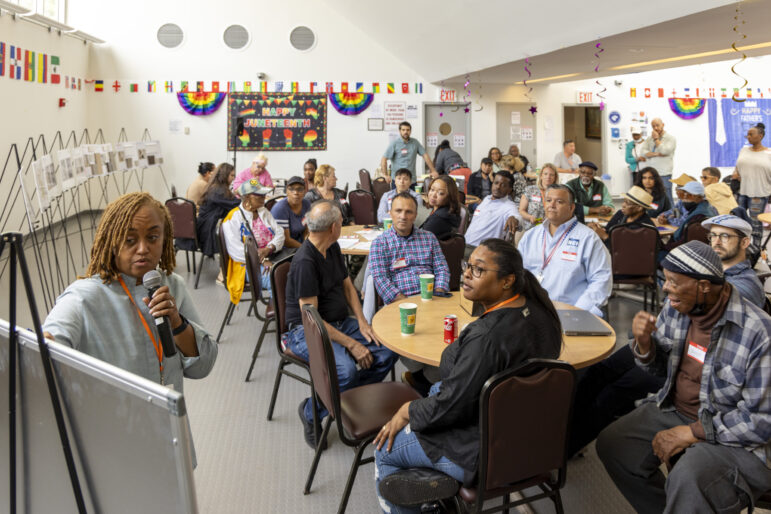After roughly three years of planning and engagement, four NYCHA developments now have new managers through one of the public housing preservation initiatives, aimed at unlocking repair funds.

NYCHA
A PACT planning meeting with tenants at NYCHA’s Boston Road Plaza development.A NYCHA development in Harlem and three public housing campuses in the northeast Bronx are the newest additions to the Permanent Affordability Commitment Together (PACT) program— with the conversion expected to bring more than $800 million in total capital investments.
On Wednesday, the New York City Housing Authority (NYCHA) announced that the Boston Secor, Boston Road Plaza and Middletown Plaza, home to 1,600 tenants, are now officially part of the PACT program. The announcement comes less than a week after NYCHA shared that the Frederick Samuel Apartments in Harlem, home to nearly 1,300 residents, also converted to PACT.
PACT is part of a larger nationwide initiative called the Rental Assistance Demonstration (RAD) that launched under the Obama administration in 2011, in an effort to bring more investment to aging public housing properties.
During the conversion process, NYCHA campuses transfer from the traditional Section 9 public housing program to another program called Project Based Section 8, which offers twice as much federal funding. After, the developments are managed by a private manager that takes over the day-to-day operations for matters ranging from maintenance requests to rent collection, while NYCHA continues to own the land.
PACT is one of the solutions NYCHA has turned to in order to chip away at the mounting cost of capital needs. So far, there are 37,851 units in the planning and engagement stage, under construction or completed construction for PACT, which will facilitate an estimated $13.2 billion worth of renovations. The goal is for NYCHA to convert 62,000 apartments by 2028.
But the changes haven’t been without criticism. In April, during a City Council hearing, attorneys from both the Legal Aid Society and Legal Services NYC cited the lack of effective tracking for work repairs for tenants undergoing PACT conversion, and continued poor conditions for some even under new management. Beyond repairs, there are tenants who want to keep public housing public, who are pressing for more funding and resources for Section 9 instead.
NYCHA previously said that PACT partners use their own tracking measures for repairs, and the housing authority collects that data. As of the second quarter of 2024, 83 percent of work orders sent in by PACT tenants were completed on time. By contrast, as of July 2024, NYCHA reported an average of 394 days to complete repairs in its Section 9 developments (the target is 15 days).
In 2016, when PACT officially took off in New York City, the housing authority needed an estimated $40 billion to repair all of its properties over the next couple of decades. Last year, NYCHA announced that it now needs almost double the amount—$73.8 billion over the next 20 years. Congress only provides about $700 million a year for NYCHA, a slice of what it needs to accomplish comprehensive repair work.
None of the PACT campuses that have been converted so far gave residents the opportunity to formally vote on joining the program.
In 2023, NYCHA kicked off a voting process, where tenants at selected campuses can decide from three options, including converting to PACT or to remain in Section 9. They can also vote to join the Public Housing Preservation Trust, which is similar to PACT in that it also converts properties to the Project-Based Section 8 subsidy.
Doing so can unlock revenue from other funding streams, such as bonds and mortgages, in order to do repairs. However, under the Trust, NYCHA continues to manage housing complexes.
Since last fall, four developments were selected to vote—three opted for the Trust, while Brooklyn’s Coney Island Houses chose to stay in Section 9. Tenants living in the Hylan Houses in Brooklyn are slated to vote in December.
Frederick Samuel Apartments
The Frederick Samuel Apartments, located between Malcolm X Boulevard and Adam Clayton Powell Jr. Boulevard in Manhattan, are made up of 42 mostly low-rise walk-up buildings.
NYCHA on Thursday closed a deal with two Harlem-based, minority-owned business enterprises—Genesis Companies and Lemor Development Group—to take on day-to-day management at the campus. Both developers are involved in other PACT projects in Harlem.
In the $383.6 million deal, tenants are expected to see building-wide upgrades such as new security systems and repaired pipes to prevent leaks. For individual units, there will be kitchen enhancements such as new cabinets and quartz countertops. All apartments will be repainted, according to the PACT partners.
Diana Blackwell, the tenant association president at the Frederick Samuel Apartments said the upgrades are long awaited. “Our residents will begin to receive the quality of life that they are deserving of,” Blackwell said in a statement.
Construction is expected to finish in the fall of 2027.
Boston Road, Boston Secor and Middletown Plaza
The three separate developments in the northeast Bronx are home to nearly 1,600 residents.
This PACT project will bring in three co-developers—Beacon Communities, Kalel Companies and a nonprofit, MBD Community Housing Corporation—as well as a general contractor, Notias Construction. The three properties will be managed by Wavecrest Management, which operates other PACT sites including Betances Houses and Eastchester Gardens, according to its website.
Collectively, 951 units will receive $419.6 million worth of repairs over the next several years. Although there are similarities with the renovations each development is expected to get—such as wood-stain cabinets and low flow faucets for water efficiency—there are still differences.

NYCHA
A model renovated kitchen at the Boston Secor Houses.For instance, Boston Road Plaza is a senior-designated development with close to 600 tenants. The goal, according to the community plan, is to help tenants age in place. Units will receive features such as grab bars and roll-in showers for tenants who may use a wheelchair.
The developers estimate a timeline of two to three weeks for the renovation of individual apartments, but a two year completion time overall.
“I’m very excited for work to start here,” Rev. Marilyn Oliver, the tenant association president at Middletown Plaza, said in a statement accompanying the news. “I’m looking forward to things that haven’t worked for years—elevators, intercoms, basic things—to finally be repaired.”
Are you a PACT tenant? City Limits wants to hear about your experiences under the program. Email us: NYCHA@citylimits.org.
To reach the reporter behind this story, contact Tatyana@citylimits.org. To reach the editor, contact Jeanmarie@citylimits.org
Want to republish this story? Find City Limits’ reprint policy here.








